Strengthening and expanding community-based approaches to delivering HIV treatment is vital to the long-term success of the AIDS response, according to a report launched on 20 April by Médecins sans Frontières (MSF) and UNAIDS.
The report highlights MSF’s innovative approaches to the critical challenge of how to scale up treatment to ensure that people living with HIV have access to antiretroviral therapy through ways that fit in with their daily lives.
Taking place in London, on the occasion of the Board Meeting of the Partnership for Maternal and Child Health and of the Strategy and Coordination Group of Every Woman Every Child initiative, the launch was an opportunity to show that the meaningful involvement of the community in antiretroviral therapy delivery, adherence and retention initiatives works. It was emphasized that the scale-up of financing and implementation of community-based service delivery will be essential to end the AIDS epidemic by 2030.
During the launch, Amina Mohammed, the Secretary-General’s Special Adviser on Post-2015 Development Planning, said, “I am glad that we have an opportunity to be reminded of the importance of ensuring that services and commodities reach the people and communities most in need.”
According to Tom Decroo, Operational Research Coordinator at MSF, “This document presents experiences of how community-based antiretroviral therapy delivery can improve both the level of access to HIV treatment and the quality of health outcomes for people living with HIV. They are not one size fits all solutions, but they illustrate that community-based antiretroviral therapy delivery is efficient, effective and responds to the specific needs of people.”
Despite the progress made—there were 13.6 million people on treatment as of June 2014—there is still a long way to go. Only 38% of adults living with HIV and under a quarter of all children living with HIV have access to the life-saving medicines.
Luiz Loures, UNAIDS Deputy Executive Director, noted that the move towards greater emphasis on community involvement could help better identify people in need of treatment, especially among the most marginalized and hard to reach populations. He stressed that community-based antiretroviral therapy delivery is not only good for individuals, their families and their communities, but has been shown to be more cost-effective, owing to better uptake, adherence and lower service provision cost.
Mr Loures also agreed that the pivotal role that civil society and communities have traditionally played in the AIDS response will need to be bolstered further.
“UNAIDS has launched a call for countries to Fast-Track towards ending the AIDS epidemic by 2030. If we are to reach this goal, we expect that by 2020 the percentage of community-based services will need to increase from 5% to 30%. I am proud to share with you today the efficient and effective innovations by MSF. UNAIDS will continue to support the many other organizations who are working to strengthen community-based service delivery to ensure all people in need have access to HIV treatment.”
The publication presents a number of concrete models of relevant and appropriate community-based antiretroviral therapy delivery systems that are adapted to their particular contexts. These strategies have been explored in eight countries: Democratic Republic of the Congo, Guinea, Kenya, Lesotho, Malawi, Mozambique, South Africa and Zimbabwe. They are largely focused on patients who have been taking HIV medication successfully for some time and who have no concurrent illness and immune systems that are showing signs of improved health.







